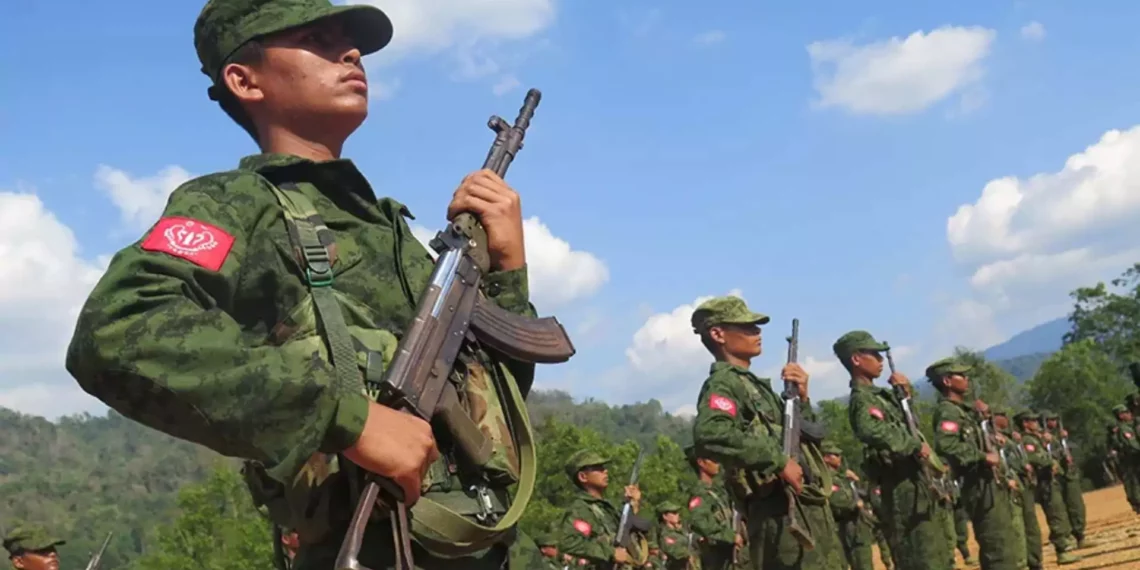The rebel Arakan Army operating in Myanmar’s Rakhine State and the Bangladesh Army have been in “contact” since the fall of Maungdaw in the second week of December with the former seeking help to keep vital supply lines open and secure.
The Arakan Army’s ‘successful’ battlefield objective could be achieved following fierce fighting over Ann and the reported capture of the Myanmar Army’s Western Military District Headquarters.
During this operation, the Arakan Army also took prisoner Ann-based Myanmar Army’s Brigadier General Thaung Htun and Brigadier General Kyaw Kyaw Than, the local commander-in-chief.
On its part, the Bangladesh Army’s Ramu-headquartered 10th Infantry Division, whose senior officers have established contact with representatives of the Arakan Army, one of Myanmar’s largest ethnic groups and a constituent of the powerful Three Brotherhood Alliance, has sought a ‘safe zone’ for the Rohingya population.
Ramu is a sub-district in Bangladesh’s Cox’s Bazar district.
Bangladesh military sources revealed to Northeast News that these field level contacts were the result of a discreet meeting among foreign ministry officials of Thailand, Myanmar, Bangladesh, China, Laos and Cambodia in Bangkok on December 19.
During the meeting, Bangladesh’s Foreign Ministry Adviser Tauhid Hossain proposed the safe repatriation of Rohingya refugees in a time-bound manner.
There are over a million and half-a-million Rohingya in camps in Cox’s Bazar (in Bangladesh) and in Maungdaw and Buthidawng in Rakhine State.
The Bangladesh foreign ministry has been kept informed of the developments and decisions being taken on the ground, especially on the issue of a ‘safe zone’ for Rohingya refugees who fled in the wake of the capture of Maungdaw and those who might try to leave their original locations in the days to come.
The fall of Maungdaw ensured full control for the Arakan Army over the 271-km-long Bangladesh-Myanmar border.
Maungdaw is right on the east bank of Naf river through which runs the Bangladesh-Myanmar border.
Besides the Arakan Army, the Three Brotherhood Alliance comprises the Myanmar National Democratic Alliance Army (MNDAA) and the Ta’ang National Liberation Army (TNLA).
Further eastward is another Rohingya-populated district, Buthidaung. However, scattered areas in the Rakhine State still remain in full or partial control of the Myanmar Army, which necessitated the ‘negotiations’ to ensure that the Arakan Army’s supply lines remain secure for its fighters.
A recent Arakan Army ‘press note’ indicated that the capture of Ann township marked the fall of 14 key towns in the Rakhine State.
The other 13 towns now in full control of the Arakan Army are Paletwa (in the Chin State), Pauktaw, Minbya, Mrauk-U, Kyauktaw, Myebon, Ponnagyun, Rambre, Rathedaung, Buthidaung, Thandwe, Taungkot and Maungdaw.
Reports emanating from the Rakhine State suggest that the Arakan Army continues its offensive against the Myanmar junta troops in Gwe township.
However, the rebel outfit’s soldiers still have Sittwe, Kyaukphyu and Manaung towns, which continue to be defended by the Myanmar junta troops and air force, left to capture.
Sources in Bangladesh’s security establishment disclosed that Dhaka was favourably inclined towards the establishment of a ‘safe zone’ for the Rohingya. After the fall of Maungdaw earlier this month, the Arakan Army had crossed the Naf river and entered Bangladeshi territory for two days before returning to their bases in the Rakhine State.
However, the negotiations continued with the Bangladeshi military and security officials who saw an opportunity to bargain with the Arakan Army over the Rohingya ‘safe zone’.
The Bangladeshi authorities, sources said, were favourably inclined to ‘recognising’ the Arakan Army while also taking steps to ensure that supply lines remained secure for the rebel outfit.















